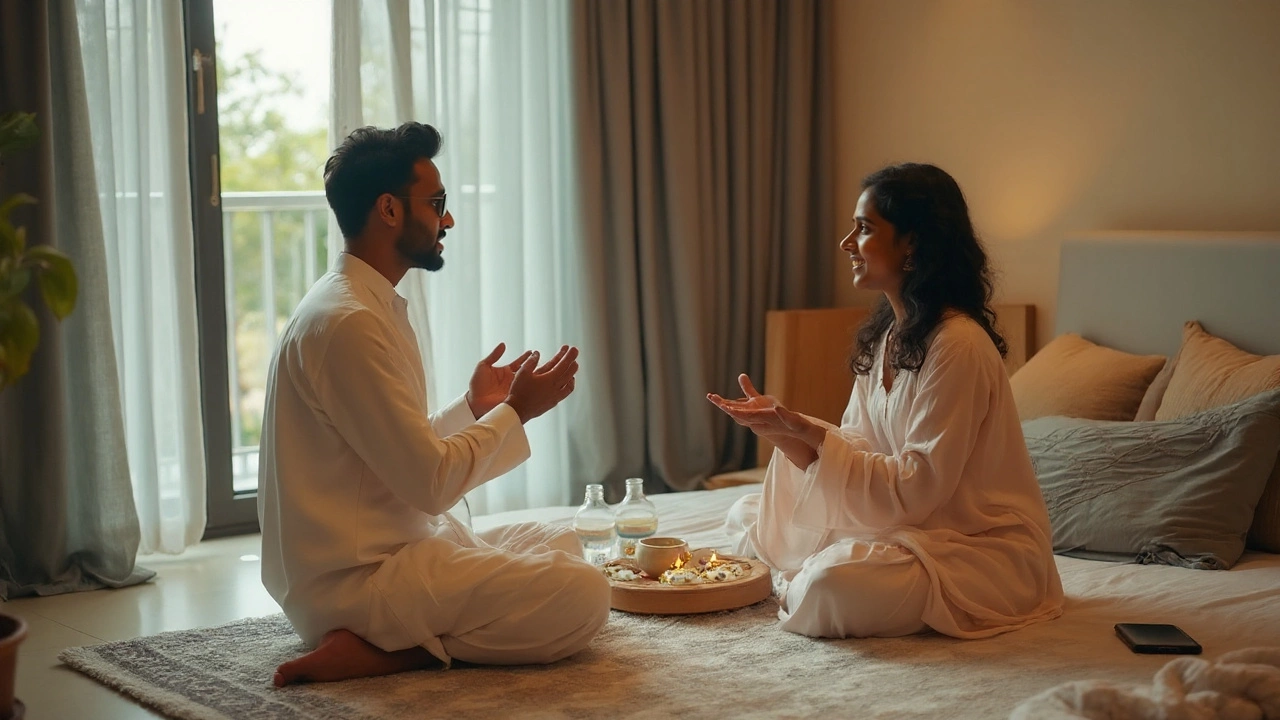You clicked this because you want a straight answer: what is the first night in marriage-really? Short version: it’s not a test, not a deadline, and not a scene from a movie. It’s a transition. Two tired humans coming off a huge day, deciding how to start living together-calmly, kindly, with consent. Sex may happen, or not. What matters is that you both feel safe, respected, and connected. That’s it.
What the “First Night” Really Means Today
first night in marriage usually refers to the first private night after the wedding-also called the wedding night, and in many Indian cultures, the Suhag Raat. Historically, people loaded it with pressure: consummation, proof, performance. Today, healthy couples treat it as a gentle first step into married life. You decide the pace. No outsiders get a vote.
TL;DR / Key takeaways
- It’s about connection, not performance. Sleep is allowed. So is no sex.
- Consent and comfort come first. Check in with each other; nothing is automatic.
- Talk basics before the day: boundaries, contraception, privacy.
- Focus on simple intimacy: food, shower, cuddles, one thing at a time.
- Traditions are flexible. Keep what feels respectful, skip what feels performative.
What you’re trying to get done (your “jobs”):
- Understand what the first night actually means in 2025.
- Set realistic expectations (including if sex doesn’t happen).
- Have a simple, step-by-step plan you can follow when you’re exhausted.
- Navigate cultural rituals (like Suhag Raat) without pressure.
- Handle practical stuff: privacy, contraception, boundaries, aftercare.
Why pressure backfires: performance anxiety is real-especially after a long day, heavy clothes, photos, speeches, family, and travel. In clinical research on sexual function, anxiety is a well-known disruptor of arousal for all genders (Kinsey Institute summaries; ACOG guidance on sexual pain and anxiety). The fix is not willpower-it’s safety, slowness, and honest communication.
About Suhag Raat and similar customs: in many Indian families, the room is decorated, a glass of milk is offered, relatives tease, and the couple is expected to “complete” the marriage. Plenty of modern couples keep the symbolism and ditch the pressure. The healthiest approach is “meaning over milestone.” Light the candle, drink the milk-then do what feels right for you both.
Step-by-Step: How to Navigate Your First Night
You don’t need a big plan. You need a simple one you can follow half-asleep. Here’s a calm, practical flow.
- Claim privacy early. Before the reception ends, ask a trusted person to run interference so you can leave on time. If families expect games or rituals late into the night, agree on a polite cut-off (“We’ll join for 20 minutes, then rest”).
- Reset your body. Eat something light with actual protein and carbs-fruit, yoghurt, a sandwich. Hydrate. Wash off the day (quick shower together or solo). Change into soft clothes that feel like you.
- Have the 90-second consent chat. Try: “How are you feeling-tired, excited, nervous? What would feel good tonight? We can sleep, cuddle, or go slow.” Clarity beats guessing.
- Pick one small, kind thing. Examples: a back rub, slow dancing in the room, sharing a warm drink, or lying down and talking about your favorite moment. If arousal shows up, great. If it doesn’t, also great.
- If you choose sex, go slow and keep it safe. Use lube, choose a comfortable position, and communicate. If anything hurts or feels off, stop. First times don’t have to be penetrative or goal-driven. Pleasure can be kissing, touching, or simply being close.
- Do aftercare. Freshen up, cuddle, drink water, set an alarm for breakfast if you’re traveling. Say one nice, specific thing you appreciated about the day or about each other. That memory will outlast the ring ceremony.
- Sleep-seriously. Most poor first nights come from overextending. Rest is the smartest intimacy tool you have.
Practical prep checklist (throw this in your overnight bag):
- Comfy sleepwear, spare underwear, and an easy outfit for the next morning
- Snacks and water, lip balm, pain relief if you get headaches
- Contraception you actually know how to use; water-based lubricant
- Travel-sized toiletries and makeup remover
- Phone chargers and a tiny Bluetooth speaker for music
- Eye mask/earplugs if you’re in a noisy hotel or family home
Consent and comfort-quick scripts:
- “Green, yellow, red?” (Yes, maybe, no) Keep it simple.
- “I’m excited to be with you. Can we just cuddle and talk tonight?”
- “I want to, but I’m tired. Tomorrow morning?”
- “This is a no for me. I love you. Let’s order dessert and watch something.”
If it’s your first sexual experience: Zero rush. Pain is a stop sign, not a price to pay. Use plenty of lube, breathe, and take breaks. If any partner has a history of pain with sex, anxiety, or trauma, plan for gentler intimacy and consider chatting with a clinician in advance (ACOG patient guidance on sexual pain; WHO sexual health basics). Your marriage is not a deadline.

Examples, Traditions, and a Reality Check
Stories beat theories. Here are real-world patterns couples fall into and how they turned out fine.
Scenario 1: The performance trap
Amrita and Karan reached their decorated room at 1:30 a.m., starving and stiff from outfits. The pressure to “complete” the night felt heavy. They ate biryani from a takeaway box, took turns in the shower, and lay down to talk about the funniest auntie moment. They slept. They had unhurried sex on their mini-moon. Zero regrets. They kept the ritual (milk, petals) but set a boundary on the meaning.
Scenario 2: The long-distance reunion
Two partners who’d been apart for months imagined fireworks. The reality: both cried from relief, then laughed, then fell asleep tangled up. They said the thing out loud: “I missed you.” Sex the next day felt better because the pressure was gone.
Scenario 3: The hotel comedy
Noise next door, faulty key card, missing bag-chaos. They ordered fries, played a playlist, and danced in socks. One chose a massage; the other dozed. They joked later that the fries saved the marriage. A silly reset can be the most intimate thing you do.
Scenario 4: Arranged marriage, first time alone
Two people mostly known through family settings sat down with tea and swapped five non-negotiables: sleep preference, morning routines, touch boundaries, phone habits, faith practices. They agreed on a slow-burn approach. They kissed goodnight. Trust first; everything else follows.
Traditions you might see (and how to handle them):
- Room decor: Flowers, candles, bed art. Enjoy the aesthetics, remove what triggers allergies or sneezing, and make space to actually lie down.
- Milk or sweets: It’s symbolic-nourish each other. If you’re lactose intolerant, smile and set it aside. The point is care, not calories.
- Family teasing: Play along lightly, then pivot: “We’re wrecked from today-see you at breakfast.” Kind, firm, done.
- Proof and rumors: No one is entitled to evidence of anything. Both law and modern ethics stand with you. Keep your privacy.
Reality check-why many couples don’t have sex the first night: fatigue, logistics, nerves, alcohol, travel delays, religious practice, or simply choice. Relationship researchers note that quality of conversation and perceived partner responsiveness predict intimacy better than the timing of intercourse (Gottman method summaries; attachment and responsiveness literature). In plain words: feeling heard matters more than what you did at 2 a.m.
Contraception basics if you plan to have sex (typical-use failure rates are per year; talk to a clinician for personalized advice):
| Method | How it’s used | Typical-use failure rate | Notes | Primary sources |
|---|---|---|---|---|
| Condoms (external) | Used at each act | ~13% per year | Protects against STIs; add lube to reduce breakage | CDC contraception effectiveness summaries; WHO |
| Condoms (internal) | Used at each act | ~21% per year | Can insert ahead of time; STI barrier | CDC; WHO |
| Combined pill | Daily | ~7% per year | Set alarms; interacts with some meds | CDC Selected Practice Recommendations |
| Progestin-only pill | Daily, same time | ~7% per year | Timing matters more; good if oestrogen not advised | CDC; Faculty of Sexual & Reproductive Healthcare |
| IUD (hormonal) | Placed by clinician | <1% per year | Long-acting; reversible | ACOG; WHO |
| IUD (copper) | Placed by clinician | <1% per year | Hormone-free; can be emergency contraception | ACOG; WHO |
| Emergency contraception pill | Within 3-5 days after sex | Event-based | Sooner is better; not for regular use | WHO; national health guidelines |
These figures come from public health standards widely used by clinicians in 2024-2025 (CDC, WHO, ACOG). If you’re in Australia or India, your local guidelines align with these ranges; check national recommendations for specifics.
Red flags-pause and seek help soon if:
- Sex causes sharp pain, bleeding, or panic that doesn’t settle. That’s not “normal first time;” it’s a sign to stop and get advice.
- Any partner pressures the other or uses guilt. Coercion is not consent.
- You’re unsure about STI status and barrier methods weren’t used. Arrange testing.
Checklists, Mini-FAQ, and Next Steps
Here’s the practical stuff you’ll actually use at 1 a.m. Keep it simple and real.
One-page cheat sheet for the night
- Food and water first. Then shower. Then talk. Then decide.
- Use soft lighting and slow music; it helps your nervous system downshift.
- Agree that “no” and “later” are respected without debate.
- If sex: lube, patience, condoms if needed, and a comfy position. No rushing.
- Aftercare: freshen up, cuddle, say something kind, sleep.
If family expectations feel heavy
- Share a united line: “We’re excited and exhausted; we’ll see you early.”
- Ask a cousin or sibling to be your boundary buddy.
- Keep the tradition, change the timeline: do the ritual, save sex for later.
Decision guide (fast):
- If both eager and rested → explore slowly, communicate.
- If one wants sleep → cuddle or hold hands, schedule intimacy for morning.
- If either anxious or in pain → skip sex, try non-sexual closeness.
- If no privacy → make the first night symbolic; plan a private night soon.
Mini-FAQ
- Do we have to have sex to “complete” the marriage?
No. Legal and ethical completion doesn’t hang on one act. Your vows are valid, your relationship is valid. - What if one of us is a virgin?
Then slowness and consent matter even more. Use lube, communicate, and stop at any pain. First sex is not supposed to hurt. - We’re in an arranged marriage and feel shy.
Talk about non-negotiables (sleep, boundaries, faith, family time) before anything physical. Shyness fades with trust. - Is morning better than late night?
Often, yes. Rested bodies respond better. Morning offers privacy and gentler light-less pressure. - Is porn a good guide?
No. It’s performance. Real intimacy looks slower, messier, kinder. - What if we argue on the wedding day?
Table big topics. Do repair work: “I’m sorry, I love you, we’re a team.” Sleep. Real talk when you’re calm.
Next steps by situation
- If you’re traveling for a mini-moon: Email the hotel to confirm late check-in, quiet room away from lifts, extra water, and a light snack in the room. Small comforts change everything.
- If you’re staying with family: Ask for a locked room and a no-knock window. Use white noise on your phone.
- If either partner is nervous about sex: Set a longer timeline-two to six weeks. Focus on non-penetrative intimacy. Consider a pre-wedding chat with a GP or a sex therapist for strategies.
- If you want kids soon: Talk to a clinician about preconception health, folate, and timing before the wedding. If not, sort contraception you both understand, well ahead.
- If you are LGBTQIA+ or in a second marriage: Same rules: consent, comfort, clarity. Ditch scripts that don’t fit you. Write your own first-night story.
Troubleshooting quick fixes
- Tension or awkwardness? Change the task. Share your favorite memory of the day. Laughter resets the room.
- Dryness or discomfort? Use more lube, more time, more warm-up. If pain persists later, see a clinician.
- Condom breaks? Pause. Consider emergency contraception as appropriate and STI testing per local guidelines. No shame, just action.
- Too many interruptions? Turn off notifications, put the phone on airplane mode, and put a “Do Not Disturb” tag if in a hotel.
- Late-night hunger? Protein and carbs beat sugar. Think yoghurt, nuts, a simple sandwich.
The first night isn’t a finish line-it’s a tone-setter. Choose a tone of gentleness, honesty, and care. Years from now, you won’t remember whether sex happened at 2:07 a.m. You’ll remember how you made each other feel safe when the world was loud.



